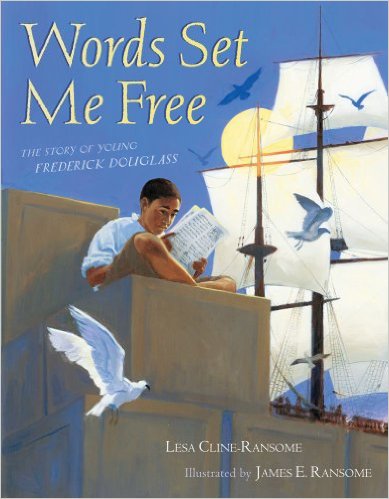As a historian and a bibliophile, I have a soft spot in my heart for children’s books that stress famous historic figures’ interest in, and love of, reading. In Words Set Me Free, Lisa Cline-Ransome uses the Narrative of the Life of Frederick Douglass: An American Slave to set the stage for one of Frederick Douglass’s main thematic threads in his autobiography: education was the key to true freedom.
Cline-Ransome begins with the story of Douglass’s early life and chooses some of the most dramatic images from the Narrative to include:
She also uses a portion of Hugh Auld’s declaration to his wife to show the reason that education, in this case the ability to read, would become so important to Douglass: “He should know nothing but to obey his master--to do as he is told to do. If you teach him how to read, there would be no keeping him. It would forever unfit him to be a slave.” From that moment on, Douglass determines if reading will unfit him to be a slave, then he must learn to read. Cline-Ransome takes us through Douglass’s learning process and how he bartered with and tricked the local boys into teaching him his letters. Even the iconic moment from the Narrative, Douglass’s lamenting over the fact that the ships he watched sail out to see had more freedom than he himself had, makes an appearance in this book. There are a few drawbacks. The language used is easy for adults, but the sentence structure and language may be too complex for younger children. The very first page of the book has two examples: “After I was born, they sent me to my Grandmamma and my Mama to another plantation," and “Cook told me my mother took sick. I never saw her again.” This is not necessarily a bad thing, but be prepared for questions from younger readers. I also dislike the ending of the book. The Epilogue describes Douglass’s first escape attempt in 1835, in which he and several slaves from the plantation tried to escape with forged passes. If you stop reading here--as many would after an Epilogue--and have no more knowledge of Douglass’s story than what is in this book, you would be left with the impression that this escape attempt was successful. It was not. The rest of the story is buried in an Author’s Note on the bibliographical page in the very end of the book. All in all, this is a good introduction to the life of Frederick Douglass for young elementary students, and also provides a historical reference to encourage an interest in, and love of, reading.
0 Comments
Leave a Reply. |
AuthorToni is a wife, mom and history buff who loves bringing the Civil War to life for family members of all ages. Archives
July 2018
Categories
All
|

 RSS Feed
RSS Feed